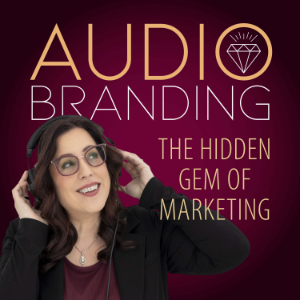
Audio Branding
Education Podcasts
Keeping a consistent sound in how you present your company really is the "hidden gem" of marketing. But audio or sonic branding influences us in many different ways and in many different places within our lives. Education is key! I explore that here, both with my own observations and by interviewing knowledgeable professionals in the field of advertising, marketing, music, technology and science. Want to be a guest on Audio Branding? Do you contribute something unique to the world of sound? Send me a message on PodMatch, here: https://www.podmatch.com/hostdetailpreview/jodikrangle and we'll talk. This podcast uses the following third-party services for analysis: OP3 - https://op3.dev/privacy
Location:
Canada
Genres:
Education Podcasts
Description:
Keeping a consistent sound in how you present your company really is the "hidden gem" of marketing. But audio or sonic branding influences us in many different ways and in many different places within our lives. Education is key! I explore that here, both with my own observations and by interviewing knowledgeable professionals in the field of advertising, marketing, music, technology and science. Want to be a guest on Audio Branding? Do you contribute something unique to the world of sound? Send me a message on PodMatch, here: https://www.podmatch.com/hostdetailpreview/jodikrangle and we'll talk. This podcast uses the following third-party services for analysis: OP3 - https://op3.dev/privacy
Twitter:
@JodiKrangle
Language:
English
Contact:
905-836-5444
How Precision Audio Shapes Marketing: Nikolaj Kloch on Videography
Duration:00:18:50
Building Brand Loyalty with Sound: A Conversation with Dr. Thomas Dickson - Part 2
Duration:00:30:42
Why Music Matters in Marketing: A Conversation with Dr. Thomas Dickson - Part 1
Duration:00:30:38
How Sound and AI Transform Marketing: A Conversation with Darren Borrino - Part 2
Duration:00:33:53
How Sound Builds Brand Trust: A Conversation with Darren Borrino - Part 1
Duration:00:30:26
Silence, Sound & Emotion – The Hidden Power of Audio: A Conversation with Karsten Kjems - Part 2
Duration:00:28:51
How Sound Design Influences Marketing & Branding: A Conversation with Karsten Kjems - Part 1
Duration:00:28:39
Why Sound Matters in Modern Advertising: A Conversation with Ted “Theo” Rosnick - Part 2
Duration:00:36:01
Behind the Sound of Advertising: A Conversation with Ted “Theo” Rosnick - Part 1
Duration:00:36:35
The Soul of Sound: Why Film Still Needs Human Creativity: A Conversation with Benjamin Kapit - Part 2
Duration:00:31:46
The Power of Sound Design in Film: A Conversation with Benjamin Kapit - Part 1
Duration:00:34:01
The Universal Language of Music: A Conversation with Stephen Ridley - Part 2
Duration:00:38:20
The Power of Music: A Conversation with Stephen Ridley - Part 1
Duration:00:42:26
How Online Technology is Changing Music Collaboration: A Conversation with Rebekah Wilson - Part 2
Duration:00:25:28
How Music and Technology Connect Us: A Conversation with Rebekah Wilson - Part 1
Duration:00:24:44
Finding Success on YouTube with Sound & Authenticity: A Conversation with Marco Cammarota - Part 2
Duration:00:30:54
The Healing Power of Video Game Music: A Conversation with Marco Cammarota - Part 1
Duration:00:30:31
Unlocking the Secrets of Music Video Production: A Conversation with Andy Gesner - Part 2
Duration:00:31:01
The Power of Sound and Vision in Music: A Conversation with Andy Gesner - Part 1
Duration:00:29:56
The Future of Podcasting & Legal Branding: A Conversation with Dennis Meador - Part 2
Duration:00:30:42